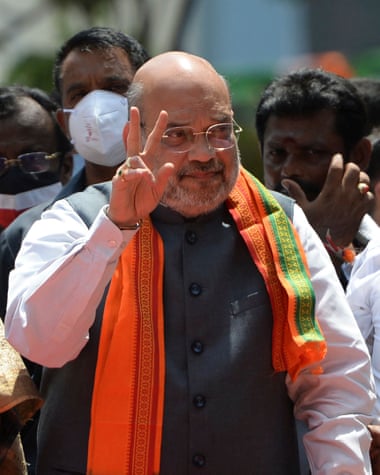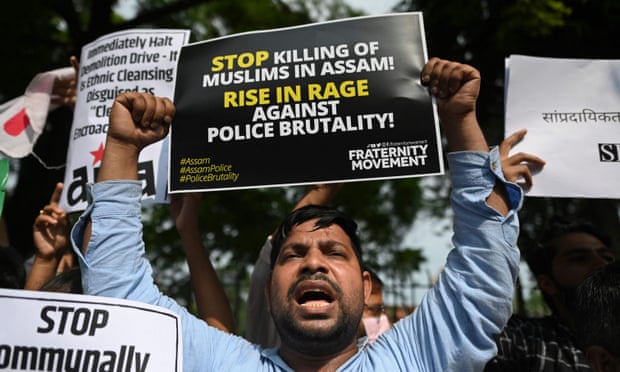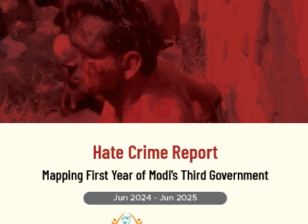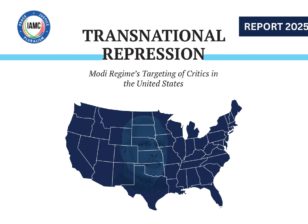‘Do we not have any rights?’ Indian Muslims’ fear after Assam evictions
BJP government accused of ‘divide-and-conquer policy’ as villagers are beaten and shot
Maynal Haque was holding a bamboo stick in his hand when the police shot him at point-blank range. All around him, the houses of the village he grew up in were being destroyed or set alight by police. As Haque fell to the ground, officers’ batons pounded on his body and a photographer, appointed by police to document the raid, ran over and began stamping hard on him, a scene caught in video footage. Once dead, Haque was rolled into a bulldozer and carried off by officers.
“He was with just a stick but they fired at his chest,” Haque’s wife, Mamataj Begum, said through tears. “They killed him in a brutal way. The sole breadwinner of our family is murdered by police. How shall we live without him?”
Haque, a 33-year-old father of three, lived in Dhalpur, a cluster of villages in the north-east Indian state of Assam, making a living growing vegetables on the fertile land beside the Brahmaputra river and selling them in the market. Like most residents in the villages, home to about 25,000 people, he was a Bengali Muslim – whose ancestry goes back to Bengal and who typically speak Bengali – and had lived his whole life in this community, established in the 1970s.
Most migrated to Dhalpur from other regions of Assam after their land was lost to erosion. Over five decades, the community cultivated the land to build their houses and grow rice and produce next to the riverbank.
But on the morning of 23 September, police descended to clear away the inhabitants of Dhalpur. According to the Assam state government, ruled by the Hindu nationalist Bharatiya Janata party (BJP) that also governs India, this Bengali Muslim community were “illegal encroachers” on government land and on adjacent land which belonged to an ancient Shiva temple.
Yet many believe that the violent eviction that followed, that killed both Haque and a 12-year-old boy, Sheikh Farid, as well as injuring dozens of others including police, was not simply about reclaiming public land. Residents, activists and scholars have alleged that it is part of a broader campaign in Assam to portray Bengali Muslims as foreigners unworthy of citizenship rights, who should go “back to Bangladesh” – despite most being born in India.
“These evictions in Dhalpur are part of the BJP’s drive to politicise and dismantle the citizenship rights of the Bengali Muslims in Assam, and this is a very dangerous path,” said Angana Chatterji, an anthropologist at University of California, Berkeley, who recently wrote a study on the alleged abuses in Assam.
“We see the chilling nationalist fervour that these evictions induce. It reiterates their violent divide-and-conquer policy: fracturing communities along religious fault lines to ultimately establish a Hindu majoritarian state.”
For decades, Assam has been afflicted by divisive fears that outsiders, mainly those from neighbouring Bengal and Bangladesh, are settling illegally. But tensions have worsened since the BJP came to power in the Assam state government in 2016, with Bengali Muslims finding themselves increasingly ostracised and demonised as the “outsiders” and “infiltrators”.
Bengali Muslims have suffered most from the National Register of Citizens (NRC), a citizenship survey carried out by the BJP government in 2019, on all residents of Assam to identify those deemed to be illegal immigrants. While over a million Bengali-origin Hindus and Muslims, many who had been born in Assam, found themselves left off the register, an amendment to the citizenship law by the BJP government means that Hindus not on the NRC will likely be able to apply for citizenship anyway, leaving Muslims facing statelessness, expulsion or detention.

Amit Shah, the home minister, has spoken of making Assam ‘infiltrator-free’. Photograph: Arun Sankar/AFP/Getty Images
This year the BJP has increased its rhetoric on driving “infiltrators” from Assam. At an election rally in Assam in January, the home minister, Amit Shah, the closest ally of the prime minister, Narendra Modi, said: “Do you want to make Assam infiltrator-free or not? … Only the BJP can do that.” Yogi Adityanath, a hardline Hindu monk and BJP chief minister of the state of Uttar Pradesh, also made speeches in March mentioning infiltrators in Assam. That month, the party released its manifesto in the state, pledging to take land back from “illegal infiltrators” and hand it back to the Assamese indigenous people. Assam’s BJP chief minister, Himanta Biswa Sarma, has repeatedly referred to Bengali Muslims in the state as Mughals, meaning the Muslim invaders of India.
Then in June, attention turned specifically to Dhalpur. During a visit to the area, Sarma declared that the land had been occupied by “illegal settlers”. Dhalpur, he announced, would be reclaimed for an agriculture project to benefit indigenous youth, as part of the BJP’s pledge to rescue “our land and the Assamese identity from encroachers and intruders”. These statements came despite around 80% of the residents of Dhalpur being on the recent national register of citizens, proving they were legal citizens of Assam.
Days later, the first Dhalpur eviction took place, uprooting 48 Bengali Muslim families and one Bengali Hindu family. Some 246 other families from the community presented a petition to the high court demanding protection from eviction. But on 18 September, more Dhalpur villagers were given notice they would have to leave the area, and two days later the mass eviction began, with 1,100 families forced to leave their homes.
But it was an eviction on 23 September in which the full force of the state came down on another 250 families, around 2,000 people, left in Dhalpur. Despite a case still pending in the courts, residents said police arrived on the night of 22 September and set fire to some of the houses as a warning.
The next day, according to witness accounts and video footage, more than 1,200 police officers descended, some with bulldozers, and began flattening the homes, mosques and madrassas in the village. “Policemen began demolishing and setting fire to some shanties, leaving the villagers very angry,” said Noor Hossain, a Dhalpur resident. “We also heard sounds of gunfire.”
Thousands of Dhalpur residents began to protest, with many refusing to comply with the evictions.
According to Haque’s brother, Ainuddin, Haque had picked up a stick and tried to chase the police away from his home. They responded by shooting him in the chest, killing him on the spot. In the resulting violence, dozens, including several police officers, were also injured and the 12-year-old boy, Shekh Farid, was killed.
NC Asthana, a social activist and retired senior police officer, said the eviction was in violation of standard police protocol, describing the actions as “unjust, unfair and above all unprofessional”.
Rupam Goswami, a senior BJP leader in Assam, denied there was any religious motivation behind the evictions in Assam. He said the police had only responded with force after “10,000 people” armed with “sticks and swords” had begun attacking the police violently in Dhalpur.
“Those who have been evicted were encroachers,” said Goswami. “They were occupying the land illegally. This is a fact. Many are saying that an issue of religion is involved in this eviction but this is not the case. Since BJP came to power in Assam in 2016, it has been trying to remove all encroachers in the state. Even Hindu encroachers have been evicted.”
The police did not respond to requests for comment. This week, the high court in Assam ordered the government to submit an affidavit about the evictions.
Some of the families driven out were given land to relocate to by the government, but it is prone to flooding. The government has also not provided them with any official resettlement documents, leaving them at risk of future eviction with no proof of their rights. Others have been given no land at all, and about 2,000 people have been left homeless.
The evictions are continuing. Last week, 500 more Bengali Muslim families remaining in Dhalpur and surrounding villages have been served notices. Meanwhile, contractors have begun work tilling the land where their neighbours once lived. To Dhalpur’s former inhabitants, it is a stark reminder of their precarious place in Assam’s society.
“We are Indian citizens like they are, yet they are evicting us from our land,” said Majed Ali, 58, another Dhalpur resident. “Do we not have any rights as citizens of India?”
This article first appeared in The Guardian




